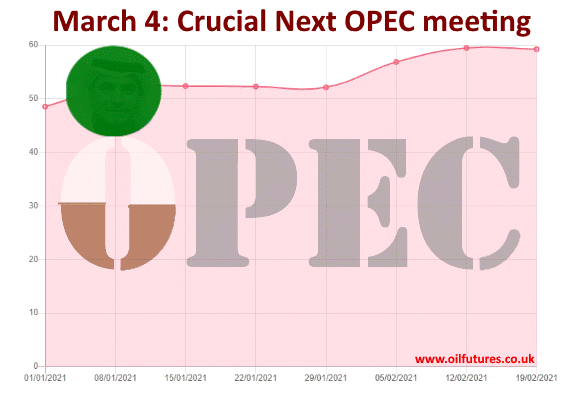In spite of the rise in oil price, defying the forecasts
that said otherwise, Saudis have been urging the members of the OPEC to be
cautious.
We do not know for sure whether the Saudis knew the
dip in price this week in advance – by instinct or from a model that the rest
of the analysts are not aware of.
Up until this week, Saudi Arabia got it calculations
right and they deserve the credit for it: their strategy worked perfectly well
and OPEC members could breathe a long, collective sigh of relief in proportion
to the rise in oil price.
In the past OPEC+ meetings, Saudi Arabia was
instrumental in bringing down the crude production by the members of the OPEC+,
while dwarfing the murmurs that favoured the polar opposite. Then, they went even further on their own with
a cut of 1million bpd for February and March. In short, the global output was
substantially slashed.
Oil price, meanwhile, rocketed as a result and the
OPEC members could not believe their luck: having faced with widening,
disastrous budget deficits that in turn inflamed the national dissent, the
countries in question manage to find a life-line to balance the books –
finally.
The relatively-poor members of the OPEC, however, could
not cash in on the fortune as much as they liked owing to the production cuts
that they, in all probability, reluctantly agree to; they may even feel that
they lost an opportunity to make hay while the Sun shone.
Against this backdrop, the members of the OPEC+ are
going to meet again on March 4.
Some analysts believe that Saudis may be under
pressure from the members to be flexible when it comes to production cuts at
the next meeting; that’s how the former interpret the recent statement by its
oil minister asking members to exercise caution.
In addition, Russian factor cannot be ignored:
Russia wants to increase its production a few months ago and reluctantly agreed
to toe the line while standing shoulder to shoulder with the rest of the
members of the OPEC+.
The fact of the matter, however, is that Russia
needs petro-cash too – and it’s fairly urgent to address its own economic woes
that stem from existing sanctions by the West.
Moreover, Russia’s relationship with the Biden
administration does not look good at present and could take a turn for the
worse as the country is heading for its own presidential elections with the main
opposition leader behind the bars.
In this context, it’s highly unlikely that Russia
will agree to a production cut that extends indefinitely.
All in all, on March 4, the bone of contention
between Russia and Saudi Arabia over production cuts could evolve into a tug of
war with pumped up diplomatic muscles creating a spectacle for anxious OPEC+
members to watch, fret and fume.







